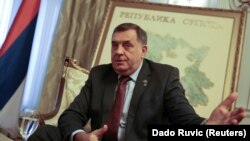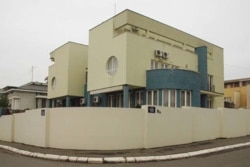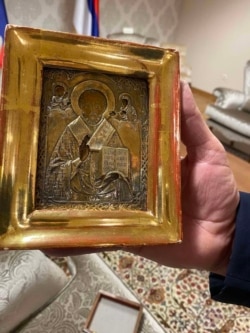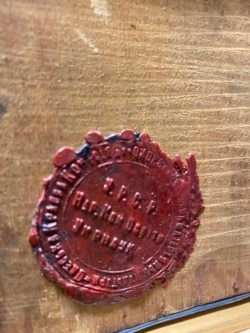On January 5, the U.S. Treasury Department imposed fresh sanctions on Milorad Dodik, the Serb representative in the tripartite presidency of Bosnia and Herzegovina (BiH), for “corrupt activities and continued threats to the stability and territorial integrity of BiH.”
Dodik, the Serbian nationalist leader of Republika Srpska, has been under U.S. sanctions since 2017 for allegedly undermining the Dayton Peace Accords, the 1995 treaty that ended a bloody ethnic conflict in the Western Balkans.
Signed by the presidents of Bosnia, Herzegovina, Croatia and Serbia with U.S. backing, the treaty laid the groundwork for establishing Bosnia and Herzegovina, a nation led by a triumvirate of leaders representing each of its largest ethnic groups – Serbians, Bosniaks and Croats.
Dodik has been an outspoken denialist of the war crime accusations against the Serbian military, calling them “lies.” He also disputes the killing of some 8,000 Bosnian civilians in the town of Srebrenica in 1995.
Dodik recently started a process of withdrawal from the BiH. He endorses a unified Serbia, which experts view as a threat to European security that could incite renewed ethnic warfare.
“Milorad Dodik’s destabilizing corrupt activities and attempts to dismantle the Dayton Peace Accords, motivated by his own self-interest, threaten the stability of Bosnia and Herzegovina and the entire region,” a U.S. State Department official said in announcing the new sanctions.
“Dodik has used his official BiH position to accumulate personal wealth through graft, bribery, and other forms of corruption,” the department stated.
Dodik responded:
“[N]o criminal proceedings for corruption are being conducted against me in BiH or anywhere else in the world."
That is false.
In fact, Dodik has been the target of numerous corruption investigations since 2008, with at least one investigation ongoing, according to BiH Chief Prosecutor Milanko Kajganic.
Kajganic confirmed to the Bosnian news site Klix.ba on January 5 that his office is investigating the source of the money Dodik used to purchase a villa in Belgrade in 2007 for 750,000 euros ($1.1 million). According to prosecutors, Dodik claimed he used a personal loan, but the loan was not taken out at the time of purchase.
Citing the investigation, Klix.ba reported that Dodik borrowed the money a year later. Adding to the suspicions, Dodik’s loan application was stamped with the seal of the Republika Srpska government. He was serving as prime minister at the time.
In December 2020, the BiH prosecutor’s office said it had launched an investigation into the origins of a 300-year-old icon Dodik presented as a gift to visiting Russian Foreign Minister Sergey Lavrov in Sarajevo.
After Republika Srpska state media published a photograph of the icon, the Ukrainian Embassy in Sarajevo said that, based on its authenticity seal, the icon had been stolen from the Ukrainian city of Luhansk in the Donbas region. Dozens of Serb nationalists fought in the Russia-backed war in Donbas against Ukrainians troops, Reuters reported. Dodik declined to comment on a matter.
Russia said it was returning the gift after it was revealed to be stolen.
“Dodik long been accused of having engaged in smuggling and trafficking during the war, hence his local nickname ‘Mile Ronhill’ (as in Ronhill cigarettes). Within contemporary BiH, he's also widely understood to be one of the chief criminal kingpins in the country, arguably the most significant,” Jasmin Mujanovic, political scientist and author of the book “Hunger and Fury: The Crisis of Democracy in the Balkans,” told Polygraph.info.
In 2016, Bosnian and foreign media outlets published a list of Dodik’s “150 scandals” involving alleged corruption and abuse of office.
Among these was the BiH State Investigation and Protection Agency’s (SIPA) investigation in 2008 into the large-scale misappropriation of government funds, nepotism, abuse of power, tax evasion and suspected money laundering.
That investigation hit a dead end in 2011, after the SIPA handed the case over to the Republika Srpska special prosecutor’s office, which swiftly closed it, citing a lack of evidence.
The Berlin-based corruption watchdog Transparency International reported in 2008 that Dodik threatened the group after it released a report on privatization deals in the oil and energy production sectors.
In October, BiH prosecutors told Radio Free Europe/Radio Liberty that Dodik was the target of a criminal case could get him five years in prison for “undermining the constitutional order.”
“This is a criminal offense under the Criminal Code of Bosnia, which states that whoever tries to change the constitutional order of Bosnia-Herzegovina or overthrow its highest institutions by using physical force or threatening to use physical force, shall be punished by imprisonment for at least five years,” RFE/RL reported.
The investigation is related to Dodik’s secessionist machinations.
There is little doubt about pervasive corruption in Bosnia-Herzegovina.
A 2020 report by the Organization for Security and Cooperation in Europe’s mission in Bosnia and Herzegovina cited “a failure of the criminal justice system, resulting in de facto impunity for the perpetrators of many serious offenses.”
The European Commission reported in 2019 that corruption in BiH “is widespread ... and that all government levels show signs of being controlled by politics, which has a direct impact on everyday life of its citizens, particularly in the field of healthcare, education, employment service and public procurement.”
Regarding the new sanctions, the U.S. embassy in BiH said Dodik and his inner circle “shamelessly abused their positions to enrich themselves, their families, their political cronies, and the patronage networks they exploit.”
The Treasury Department accused Dodik of setting up a patronage network and providing government contracts and monopolies to business associates. “With his corrupt proceeds, Dodik has engaged in bribery and additional corrupt activities to further his personal interests at the expense of citizens,” the department alleges.
In addition, Treasury said Dodik effectively controls the Banja Luka media outlet ATV, owned by a company linked to his family.
“Dodik acquired ATV to deliberately and expressly further his own agenda, which includes his efforts to denigrate other political figures, burnish his public image, and advance his own personal and political goals,” the department said.
“Dodik has awarded ATV-related contracts directly to members of his family, which he has used as yet another avenue for corruption. He has funneled money directly from public companies to ATV for corrupt purposes.”
ATV disputed the U.S. claims.
“We are surprised with such a decision and regard as extremely trivial that a great state should take individual insinuations about ties between our media house and politicians as credible sources,” the company said in a statement to Reuters.








